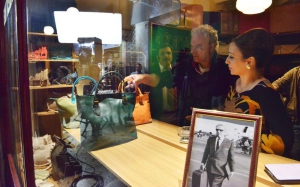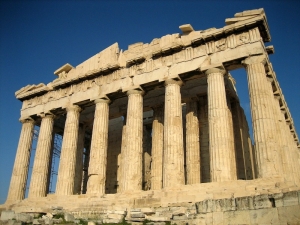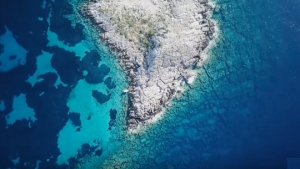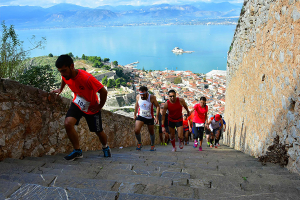BUSINESS CENTRE
XpatAthens
Wednesday, 03 June 2015 13:24
Tassos Boulmetis Travels Back To 1960s For His New Film ‘Notias’
At first glance, the Lazaridis leather goods store in the arcade at 69 Academias Street in downtown Athens seems perfectly normal, with elegant leather purses and suitcases displayed in its window. When the shopkeeper and the customer start talking, though, it becomes apparent that we are not in the present day, as the potential buyer explains that he is planning to travel to Frankfurt by coach and would like to buy the red suitcase in the display window, which is just like the one shipping tycoon Ari Onassis is holding in a photograph displayed beside it. The shopkeeper warns him that it’s expensive at 400 drachmas but he’s willing to knock something off the price.
Outside the shop, the arcade is bustling with elegant ladies with well-coiffed hair, a young man delivering coffees on a traditional metal tray and another man carrying large film reels. While the weather and traffic outside tell us that its the spring of 2015, in the arcade, the clock has gone back to 1968 for the filming of Tassos Boulmetis’s latest project, “Notias” (likely to be titled “South Wind” in English, according to the director).
Boulmetis sits in his director’s chair and orders the “shopkeeper” (played by Taxiarhis Hanos) and the “customer” (Errikos Litsis) to repeat the scene again and again so that he can get the perfect take. In parts of the arcade, the production team has created convincing scenes depicting Athens as it was in the 1960s and 70s.
Boulmetis is joined behind the camera by his assistant Margarita Manta, an acclaimed filmmaker in her own right, veteran sound mixer Marinos Athanasopoulos and costume designer Eva Nathena, who reigns over the fifth floor of the arcade, where the costume department has been set up.
In the entrance, the extras, dressed, coiffed and made up to the tiniest last detail, wait to be called for a scene that they have to repeat more than 20 times. Before the crisis, the standard wage for a film extra was 50 euros a day. Now they’re being paid half that.
My conversation with Boulmetis happens in fits and starts, between takes. “Notias” is Boulmetis’s third feature-length film after “The Dream Factory” (1990) and “A Touch of Spice” (2003) and tells the story of a boy (played by Giannis Niaros) growing up in the turbulent and promising 1960s and 70s and his journey from adolescence to adulthood as he tries to make his dreams come true.
To read more, please visit: Ekathimerini
by Maria Katsounaki
Published in
Local News
Tagged under
Tuesday, 23 January 2018 07:00
The Most Popular Experiences In Athens
The Acropolis, Ancient Agora, Plaka, Anafiotika, Monastiraki. The famous 'historical triangle' of Athens is full of surprises!
Whether or not you live in the city or you are making your way to the Greek islands, Athens is a must-see destination. Athens is filled with history and culture making it an unforgettable getaway. If you are visiting the city for the first time, be sure to check out these popular experiences from Discover Greece.
Whether or not you live in the city or you are making your way to the Greek islands, Athens is a must-see destination. Athens is filled with history and culture making it an unforgettable getaway. If you are visiting the city for the first time, be sure to check out these popular experiences from Discover Greece.
The Acropolis - The Sacred Rock of Humanity
Centuries seperate the Sacred Rock of the Acropolis from the city that pulsates at its feet, lively and vibrant. It is the place where it all began - philosophy, democracy, the sciences and the theatre. The cluster of temples, shrines and ruins that visitors will encounter at the Acropolis and the creations of the Golden Age of Pericles (5th century BC), form the cornerstone of European culture. It's not surprising that the Acropolis has been on the UNESCO World Heritage Sites list since 1987.
Anafiotika - An Island Beneath the Acropolis
A microcosm stuck in a previous century is carved into the northeast side of the hill of the Acropolis and looks as if it has been lifted from the Cyclades. Wanderers will get lost in its labyrinthine pathways, exploring the charming homes, past patios and whitewashed streets barely wide enough for two.
Syntagma Square - Where History is Made
Syntagma Square is the central hub of the historic centre. Walking in front of the monument of the Unknown Soldier, built in 1932, visitors can feed the pidgeons and wait patiently for the kilted Evzones to perform the changing of the guard, which happens on the hour. Behind the guards is the imposing Hellenic Parliament building. Built as a palace by the architect Friedrich von Gaertner for the first kings of early Greece who settled here in 1843, it has been home to the Greek Parliament since 1935.
To read this article in full, please visit: Discover Greece
Published in
City Discovery
Tagged under
Monday, 24 February 2025 07:00
Kathara Deftera - Clean Monday In Greece
Clean Monday (or, in Greek, Kathara Deftera) is the first day of Great Lent in the Eastern Orthodox Christian Church. It is a feast that occurs at the beginning of the 7th week before Orthodox Easter Sunday.
Clean Monday also brings preceding Carnival celebrations to an end, inviting everyone to leave behind the'sinful' attitudes associated with Carnival festivities and non-fasting foods, which were largely consumed during the three weeks of the Carnival.
Date of Clean Monday in Greece This Year:
Monday, March 3
Clean Monday Traditions Around Greece
The feast day of Clean Monday is a public holiday in Greece and is celebrated with outdoor excursions, delicious fasting foods, as well as the widespread custom of flying kites.
The second most common tradition that takes place on Clean Monday in Greece is kite flying! Although nobody is quite sure where the kite-flying tradition came from - some say that the ancient Greek mathematician Archytas of Tarentum designed and flew the first kite to test aerodynamics, while others believe it started when people would write wishes on the kites and fly them as high as possible for the gods to answer - it is now such a firmly established tradition around Greece that the weather forecast for Clean Monday is closely followed in the preceding days.
The first and most common tradition of Clean Monday in Greece, of course, involves food! Although what is served on Clean Monday does depend on a family's or individual's favorites, below are some of the most popular traditional delights included at a Greek table on Clean Monday:
Lagana is a lightly unleavened flatbread made especially for and eaten only on Clean Monday.
Taramosalata, made from tarama (cod or carp roe), sometimes called 'the common man's caviar', is one of the tastiest and most famous of all Greek dips.
Octopus, shrimp, and kalamari—seafood is a signature dish on Clean Monday!
Halva is eaten as a dessert. There are various methods of making halva, but arguably the most common is made with tahini, a sesame paste, and sugar, often combined with nuts or chocolate and baked in a square.
Wine or tsipouro—because a traditional Greek meal is not complete without a glass of delicious wine or traditional tsipouro.
Published in
Greek Traditions
Tagged under
Monday, 25 July 2016 07:00
Greek Farmer's Markets
Stroll and you shall find, if not fresh vegetables, at least a slice of the Greek psyche.
Farmers’ markets were first established in 1929 as part of “fair trade” efforts by the government to protect producers from the profiteering of middlemen, by giving farmers the opportunity to sell their products directly to customers. These markets have been popular ever since and essentially still serve the same function. As in the old days, they still take place on designated streets in each neighborhood, where on a specified day each week they become the center of social activity. A place where friends meet and catch up, neighbors run into each other (whether they want to or not) and vendors discuss current affairs with customers they’ve probably known for years.
If you are staying in the capital for more than a few days and have grown weary of museums and archaeological sites, you may want to spend a morning strolling around a farmers’ market (known in Greece as a “laiki agora” or people’s market). Farmers here typically sell their locally produced fresh fruit and vegetables, but you can also find fresh fish, eggs, olives, honey, herbs and flowers, while on the fringes of the market you may also come across cotton panties, super bras, nightgowns, along with household items such as brooms and plastic buckets.
There are many markets to choose from in the center, but the most famous and picturesque is hands down the one on Kallidromiou street in Exarchia every Saturday. The market owes much of its attraction to the surrounding neoclassical houses built in the late 19th century by the area’s first residents. While the neighborhood itself has a different claim to fame, for Exarchia has been the city’s hub of political ferment and tension since the Athens Polytechnic uprising in 1973. So don’t be surprised if among the stalls you spot left-wing radicals distributing leaflets, tirelessly urging you to say “No” to Europe.
You may not understand much if you don’t speak the language, but you will sense they are advertising something more than their goods and prices. Still, not all vendors are politically driven. Most just want to chitchat; smile back and they’ve got their cue to tell you something, anything, about life. Your nationality won’t stop them. Even with non-existent English skills, they’ll gesture frantically till you understand them. Some are more philosophical, “Why photo this old house? Falling, like us.” Others are more humorous, “No photo fruit, photo me. Twitter”.
Different nationalities, generations, personalities and ideologies converge in this modern-day Pnyx*, where all ideas are up for discussion. You may end up not buying anything, but for a few hours you will have treated yourself to a special corner of the city and to a sample of genuine Greek temperament and culture.
Other Farmers’ Markets in the Center
Other Farmers’ Markets in the Center
- Kerameikos: Kerameikou street / Tuesday
- Kolonaki: Xenokratous street / Friday
- Koukaki (near the Acropolis): Matrozou street / Friday
Market Hours
For a weekly schedule of all Farmer's Markets, please click here.
Published in
City Discovery
Tagged under
Sunday, 16 October 2016 20:54
October 11 - Around Greece & Beyond
Find your perfect fall getaway in Greece and the best off-season destinations in Europe and explore the Acropolis Museum, one of the world’s best museums!
Please click HERE to view this issue of our newsletter!
Published in
Newsletters
Tagged under
Monday, 08 January 2018 07:00
Wanderlust Greece - The Peloponnese
Discover Greece is hitting the road with its own digital travel show that gives you the stage to present Greece to the world. They will be sending guest presenters around the country, broadcasting live across all our Social Media channels.
The journey starts in the Peloponnese (Nafplio, Pylos, Kalamata, Methoni, Olympia, Monemvasia, Mani), bringing to life castles, beaches, wines, olives, cheeses, stories from the locals – and, of course lots of sun, sea and blue, blue sky. For more information, please visit: Wanderlust Greece
Published in
Videos
Tagged under
Monday, 26 November 2018 07:00
Runners Challenge Their Limits At The Nafplio Castle Run
Almost 400 runners joined the 2018 Castle Run in the town of Nafplio on Sunday, November 25. The Castle Run is a unique sporting event that aims to attract runners from all over Greece while promoting Nafplio’s natural beauty, cultural heritage, and historical significance. The event was organized by the Municipality of Nafplio in cooperation with the Regional Union of Argolis, Harvard University’s Center for Hellenic Studies in Greece, and the Sports Club of Argolis; under the auspices of EOT and Alliance For Greece.
The first part of the demanding race involves the steep climb up the 999 steps to the historic Palamidi Fortress that overlooks the town, while the second part is about 4km-long and takes place in the paved streets of the town. The Nafplio Castle Run is one of the hardest races in Greece and is addressed to experienced runners.
Published in
Local News
Tagged under
Monday, 25 February 2019 22:32
Great Golf & Familiar Faces At The 3rd Messinia Pro-Am
Actor Bill Murray, rugby champion Mike Tindall and basketball legend Joe Arlauckas added to the event’s appeal!
Costa Navarino’s 3rd International Messinia Pro-Am was held February 20-23, marking the start of the tourist season with the participation of 31 teams from 20 countries.
More than 120 professionals, celebrities and amateur golfers enjoyed the game at the award-winning The Dunes Course and The Bay Course among century-old olive trees overlooking the Ionian Sea and the historic bay of Navarino. Among the participants were Oscar-nominee and Golden Globe Award-winner Bill Murray, Mike Tindall, the former rugby player who represented England 75 times and 5 times as captain in his 17-year career and basketball legend Joe Arlauckas.
Click HERE to see the best highlights of the event!
Accommodation was provided at The Westin Resort Costa Navarino and all participants had a unique experience on and off the greens, with a rich programme including thematic a series of thematic social events culminating in a memorable gala dinner and prizegiving ceremony.
The competitive action included two rounds of golf on The Dunes Course, and one on The Bay Course. All players warmly embraced the thematic charity bowling night, and continued to lend their support for SOS Children’s Villages Greece initiatives through the Messinia Pro-Am website.
The tournament concluded with the “Buena Vista” gala dinner and award ceremony, hosted by pro golfer and TV presenter Iona Stephen and golf coach and YouTube star Peter Finch, including a special moment with actor Bill Murray who enthused: “This is the best place I’ve ever been. The golf courses are great; I’ve never been treated nicer anywhere. This is a different level; it is not like anything I’ve ever seen.”
Click HERE to see photos from the event!
At the 54-hole Strokeplay individual competition, professional golf players claimed the total prize pool of 31,000 Euros. Alessandro Tadini (PGA of Italy) with 197 points, 15 under par won the tournament, second place fell to PGA of GB&I Professional, Stuart Boyle and the PGA of Portugal’s, Tomas Gouveia, finished in third.
Gouveia also won the Team Pro-Am event with his team of Ivailo Dimchev, Lyubomir Minchev and Konstantin Sinapov. Second place went to Berni Reiter (PGA of Austria) with Franz Pichler, Johann Schygulla and Gottfried Traintinger, whilst the team of Antonis Sotiropoulos (Chairman of PGA of Greece) took third place. In the other categories, Milada Tupova-Faensen won “Closest to the Pin” award, George Vafiadis claimed the “Longest Drive Men” and Belgian Delphine Dewitte the “Longest Drive Ladies” and “Best 4-Hole Net Score”.
AEGEAN , a member of Star Alliance, was the official airline partner of the event.
Vodafone Business, Eclectic Greece by Kyvernitis Travel , Ford Motor Hellas , Athens International Airport and Hertz were the official sponsors of the event.
Luanvi was the official sportswear partner.
Official supporters of the tournament included ECOLAB , "Vikos" Natural Mineral Water , J.VOURAKIS SONS EE , Poseidonia , Pylos Poems , METAXA , Luc Belaire , Paulaner, The Blue Beetle , Nescafé Alegria and Kalamata Papadimitriou .
Fysiotek was the physio partner of the event providing rehabilitation and prevention services for sports injuries with its rehab station.
The tournament was assisted by Salty Bag , Stoli , Fever-Tree , Ahead and BiancoNero .
Erasmus was the official travel partner coordinating and ensuring the smooth registration & accommodation process.
The 3rd Messinia Pro-Am was organized in collaboration with the PGAs of Europe and was held under the auspices of PGA of Greece and the Hellenic Golf Federation . The awards were created by J.VOURAKIS SONS EE .
The gifts of the “Buena Vista” Night were offered by Luc Belaire , Salty Bag and Ahead .
Hashtag: #messiniaproam
Photo credit: Elias Lefas
Costa Navarino’s 3rd International Messinia Pro-Am was held February 20-23, marking the start of the tourist season with the participation of 31 teams from 20 countries.
More than 120 professionals, celebrities and amateur golfers enjoyed the game at the award-winning The Dunes Course and The Bay Course among century-old olive trees overlooking the Ionian Sea and the historic bay of Navarino. Among the participants were Oscar-nominee and Golden Globe Award-winner Bill Murray, Mike Tindall, the former rugby player who represented England 75 times and 5 times as captain in his 17-year career and basketball legend Joe Arlauckas.
Click HERE to see the best highlights of the event!
Accommodation was provided at The Westin Resort Costa Navarino and all participants had a unique experience on and off the greens, with a rich programme including thematic a series of thematic social events culminating in a memorable gala dinner and prizegiving ceremony.
The competitive action included two rounds of golf on The Dunes Course, and one on The Bay Course. All players warmly embraced the thematic charity bowling night, and continued to lend their support for SOS Children’s Villages Greece initiatives through the Messinia Pro-Am website.
The tournament concluded with the “Buena Vista” gala dinner and award ceremony, hosted by pro golfer and TV presenter Iona Stephen and golf coach and YouTube star Peter Finch, including a special moment with actor Bill Murray who enthused: “This is the best place I’ve ever been. The golf courses are great; I’ve never been treated nicer anywhere. This is a different level; it is not like anything I’ve ever seen.”
Click HERE to see photos from the event!
At the 54-hole Strokeplay individual competition, professional golf players claimed the total prize pool of 31,000 Euros. Alessandro Tadini (PGA of Italy) with 197 points, 15 under par won the tournament, second place fell to PGA of GB&I Professional, Stuart Boyle and the PGA of Portugal’s, Tomas Gouveia, finished in third.
Gouveia also won the Team Pro-Am event with his team of Ivailo Dimchev, Lyubomir Minchev and Konstantin Sinapov. Second place went to Berni Reiter (PGA of Austria) with Franz Pichler, Johann Schygulla and Gottfried Traintinger, whilst the team of Antonis Sotiropoulos (Chairman of PGA of Greece) took third place. In the other categories, Milada Tupova-Faensen won “Closest to the Pin” award, George Vafiadis claimed the “Longest Drive Men” and Belgian Delphine Dewitte the “Longest Drive Ladies” and “Best 4-Hole Net Score”.
AEGEAN , a member of Star Alliance, was the official airline partner of the event.
Vodafone Business, Eclectic Greece by Kyvernitis Travel , Ford Motor Hellas , Athens International Airport and Hertz were the official sponsors of the event.
Luanvi was the official sportswear partner.
Official supporters of the tournament included ECOLAB , "Vikos" Natural Mineral Water , J.VOURAKIS SONS EE , Poseidonia , Pylos Poems , METAXA , Luc Belaire , Paulaner, The Blue Beetle , Nescafé Alegria and Kalamata Papadimitriou .
Fysiotek was the physio partner of the event providing rehabilitation and prevention services for sports injuries with its rehab station.
The tournament was assisted by Salty Bag , Stoli , Fever-Tree , Ahead and BiancoNero .
Erasmus was the official travel partner coordinating and ensuring the smooth registration & accommodation process.
The 3rd Messinia Pro-Am was organized in collaboration with the PGAs of Europe and was held under the auspices of PGA of Greece and the Hellenic Golf Federation . The awards were created by J.VOURAKIS SONS EE .
The gifts of the “Buena Vista” Night were offered by Luc Belaire , Salty Bag and Ahead .
Hashtag: #messiniaproam
Photo credit: Elias Lefas
Published in
Local News
Tagged under
Thursday, 07 November 2019 07:00
Two Six-Million-Year Old New Species of Snakes Discovered In Greece
The fossilized remains of two new unknown snake species have been discovered near the city of Serres in northern Greece.
The Greek researcher who discovered the fossils that are dated back 5,5 to 6,0 million years, has named them Periergophis micros and Paraxenophis spanios.
“These two new snakes have new names because they belong to a totally new species and are completely different from any other species. The strange thing is that such vertebral anatomy has not been observed anywhere else and there is nothing, either in modern or in extinct serpent species, that even comes close to the morphology of these new species,” palaeontologist Dr Giorgos Georgalis told AMNA.
Dr Georgalis has published a scientific paper about his discovery, in collaboration with other scientists from German, Czech, and Swiss universities. According to Georgalis the serpents are so unique that it is hard to classify them under any known family, so they have understood that they belong to a new species.
To read this article in full, please visit: The National Herald
To read this article in full, please visit: The National Herald
Published in
Greece In The News
Tagged under
Tuesday, 10 March 2020 00:00
Remembering Greek Immigrant Women Pioneers
In the wake of Women's Day on March 8, this video is a tribute to pioneering Greek Women Immigrants. This inspiring video describes the life and accomplishments of some of the most open-minded, hard-working, and fierce women immigrants that immigrated to the USA at the beginning of the 20th century.
Even though it is impossible to recount the heroic Greek immigrant women, speaking of just a few invokes the memory of all of them.
It is certain that whatever heights the Greek ethnic community has attained today, is much owed to the love and labors of these extraordinary women!
Even though it is impossible to recount the heroic Greek immigrant women, speaking of just a few invokes the memory of all of them.
It is certain that whatever heights the Greek ethnic community has attained today, is much owed to the love and labors of these extraordinary women!
Published in
Videos
Tagged under











